Author: Steve Crum
THE KANSAS CITY JOLSON STORY…Part 6: “DANCING AROUND”
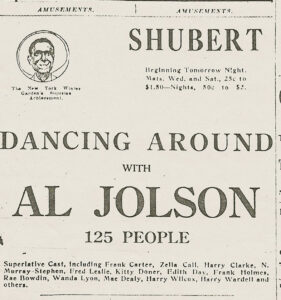 By Steve Crum
By Steve Crum
Al Jolson was 29 years old when he played KC in Oct., 1915. The Shuberts’ touring show, “Dancing Around,” this time billed Jolson’s Gus character as “a man of many parts.” Jolson’s song repertoire included “When the Grown Up Ladies Act Like Babies,” “Sister Susie’s Sewing Shirts for Soldiers,” and “Everybody Rag With Me.”
After the 12-scene “musical spectacle” made its Broadway run, Oct. 10, 1914-Feb. 13, 1915, “Dancing Around” toured the USA (and Canada) from Feb. 15 to Dec. 4, 1915–pretty much the entire year. Traveling south after two days in Omaha, Jolson and troupers played to Kansas City audiences, Oct. 3-9, before heading to St. Louis.

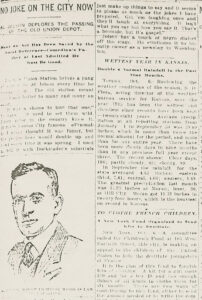 In a KC Star article published Oct. 6, “No Joke on the City Now,” Jolie laments the demise of Kansas City’s Union Depot (and what it means to comedians), and reminisces about playing in KC with Dockstader’s Minstrels. That is a rather stately looking pose of Jolson in the article’s engraving. A more typical Jolson pose, in blackface, is included within the display ad. Jolie is labeled, “The New York Winter Garden’s Surprise Achievement.”
In a KC Star article published Oct. 6, “No Joke on the City Now,” Jolie laments the demise of Kansas City’s Union Depot (and what it means to comedians), and reminisces about playing in KC with Dockstader’s Minstrels. That is a rather stately looking pose of Jolson in the article’s engraving. A more typical Jolson pose, in blackface, is included within the display ad. Jolie is labeled, “The New York Winter Garden’s Surprise Achievement.”
Oct. 6, 1915 [in town for DANCING AROUND]
Interview:
NO JOKE ON THE CITY NOW
Al Jolson deplores the passing of the old Union Depot
———-
Many an act has been saved by the local reference–comedian’s father at last admitted he must be good
———-
The old Union Station brings a pang of sorrow to Al Jolson every time he thinks of it. The old station meant bread and butter to many and many an actor.
“It was a shame to lose that one,” he says. “It used to set them wild. Every actor in the country knew it. It made Kansas City famous. Personally I never thought it was funny, but the people here would double up howl every time it was sprung. I used to tell it with Dockstader’s Minstrels when we played the Grand ten years ago. If an act was going flat, a reference to the Old Union Depot would save it. The poorest comedian in the world could bring them up out of their seats with it. It was a scream.
“I don’t know why people laugh at local jokes, but they do. My idea of fun is to get into a joshing frame of mind with the audience and work to win a group, if they warm up to you. I wish I had confidence in myself, but I haven’t. Really, I’m always afraid they’re not going to like me, and if I do flop at any performance I’m no good for three days.”
SHY ABOUT HIS OWN FACE
Jolson is a boyish chap of 29. He’s been married eight years and he got his start in burlesque and from there went on to minstrelry, vaudeville and musical comedy. In New York he frequently appears on stage in white face, but is timid about trying it in the West, where he is not so well acquainted.
“Sometimes I think I must be fooling the public,” he remarks. “I can say without egotism that I usually keep them laughing, but I don’t understand it. When I was in vaudeville I showed my father my contracts, week by week, for each house. I was getting two or three hundred dollars a week then and it dazed him. After he’d looked them all over he looked me up and down from head to foot. ‘Al,’ he said, ‘you must be good, they can’t all be crazy.’
“You know, I think I’m developing a temperament. Honest I do. It used to be they could unload a ton of scrap iron back stage when I was working and I’d shout a little louder to drown the noise and never mind it. I thought I was good then. The other night a man came in late, and when I saw him coming down the aisle it sent me up in the air. I almost blew up. If that isn’t temperament, what is it?”
AUDIENCE MAKES HIM WORK
“Another thing, I’m against the movies. I had a big offer to go into the pictures but I turned it down. Imagine me up there trying to be funny with nothing in front of me but a man turning a crank. I wouldn’t do it. You can’t act without an audience. I like a friendly, human crowd out in front, and it’s no joke–I’ll work my head off. That applause stuff gets to me. They can all say they don’t like it and all that, but it sure puts the ginger in me. Another thing, I never pick out a funny looking man in the audience and try to kid him. The fresh actor makes more enemies than he does friends. Half the time I just make up things to say and it seems to please as much as the jokes I have prepared. Get ‘em laughing once and they’ll laugh at everything. It isn’t what you say but how you say it. That’s a bromide, but it’s gospel.”
Jolson has a touch of negro dialect off the stage. He attributes it to his early career as a newsboy in Washington.
#
THE KANSAS CITY JOLSON STORY…Part 5: “THE HONEYMOON EXPRESS”
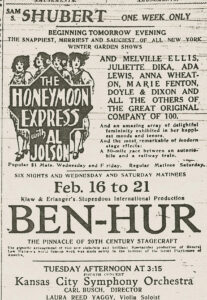 By Steve Crum
By Steve Crum
Gus, Jolson’s black butler persona, continued the one-upmanship of his “superiors” in the Shuberts’ Winter Garden hit of 1913, “The Honeymoon Express.” Jolie sang “My Yellow Jacket Girl,” “The Spaniard That Blighted My Life,” “You Made Me Love You,” “He’d Have To Get Under–Get Out and Get Under,” and “Who Paid the Rent for Mrs. Rip Van Winkle,” among other popular tunes.
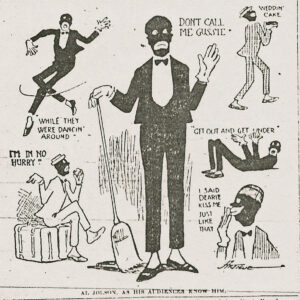 After its initial New York run, Feb. 6-June 14, 1913, the show played a grueling, 40-city schedule cross country (and out of country), Sept. 18, 1913-March 30, 1914, from Atlantic City to Toronto to Los Angeles. It was truly a Valentine for Kansas City when Jolie and “The Honeymoon Express” company performed for two weeks, Feb. 1-14, 1914.
After its initial New York run, Feb. 6-June 14, 1913, the show played a grueling, 40-city schedule cross country (and out of country), Sept. 18, 1913-March 30, 1914, from Atlantic City to Toronto to Los Angeles. It was truly a Valentine for Kansas City when Jolie and “The Honeymoon Express” company performed for two weeks, Feb. 1-14, 1914.
———-
The caricature collage (by an unknown artist) of Jolson is particularly fascinating, since it depicts six impressions of 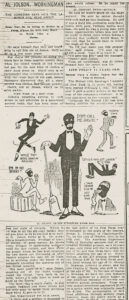
 the 1914 Al Jolson stage persona. The work is entitled: AL JOLSON, AS HIS AUDIENCES KNOW HIM.
the 1914 Al Jolson stage persona. The work is entitled: AL JOLSON, AS HIS AUDIENCES KNOW HIM.
The February 4, 1914 Interview with Jolson (no byline); includes a great one panel comic art w/six caricatures of Jolson in blackface, captioned AL JOLSON AS HIS AUDIENCES KNOW HIM.
———-
Here, to make it much easier to read, is the entire transcribed, lengthy interview with Jolie by a Kansas City Star reporter covering the theatrical event. It is fascinating.
AL JOLSON, WORKINGMAN
———-
The Comedian Says He’s The Laborer You Read About
———
Some Day, He Is Going to Retire to a Farm Where He Will Only Have to Work Like a Horse
———
He says himself that they are beginning to call him old Al Jolson. He’ll be 30 in a few more years.
But that’s the penalty of doing the black face in these musical comedy days when the fabled wealth of …lnd would not pay for the new kind of clothes a show must dress in. Black cork is so inexpensive that everybody associates it with the crude days of the past, before managers discovered that all a show needed was clothes and talcum powder.
Hence, old Al Jolson, who’ll be 30 after awhile.
FARM WORK AS A REST CURE
Jolson’s smashing success in cork seems to call attention to a somewhat ancient truth that has been more or less lost sight of recently. Which is (it was in the old copy books) that all you have to do to succeed is to work at it. Jolson works at it. He works like a longshoreman. Prodigal of voice, of energy, of good nature, he meets every demand of applauding audience until the last curtain, and then while the people whom has kept laughing for two hours are discussing at after theater suppers the easy life he leads, he is writhing under the hands of an osteopath kneading the soreness out of his throat muscles.
“Six more years of it,” says Jolson, speaking out of the cloths wrapped round his throat, “then back to the farm, where I’ll only have to work as hard as the horses.”
The farm–it’s a ranch really–is just outside Oakland and there Jolson and his wife plan to spend their declining days when Al gets to be 35.
THE WORKINGMAN YOU READ ABOUT
“A farm and a million is supposed to be the ambition of everybody on the stage,” says Jolson. “I’ve got the farm and don’t intend to wait for the million. I quit at 35 without counting the roll. Meanwhile anybody who wants to know what work is like can come and watch me. I’m the workingman you read about in books.”
Jolson has been a workingman since back in ’98 when he began to do the blackface thing in a circus–or in the stay-for-the-concert-only-ten-cents that followed the show in the big top. He was 13 then. Previously he had been playing marbles on the streets of Washington with woolly headed negro boys and acquiring their dialect, and incidentally their marbles. From the circus to minstrelsy, thence to vaudeville and finally to stardom in musical comedy have been rapid steps. You see, he was working all the time. Merely that. Few people have tried that method before.
NO LOAFING BETWEEN VERSES
When Jolson isn’t singing or dancing, he’s making a speech. He doesn’t like to be idle. Frequently he has as much as a minute and a lot of seconds between songs, in which he has absolutely nothing to do. So he makes the audience a speech. Audiences, being foolish and liking nothing better than to laugh, got to look upon these speeches as part of the program. They got to demanding them. It just goes to show what a lot of work a man can make for himself when he is so simple as to go out and look for it.
But Jolson’s first speech wasn’t to an audience. It was to a manager. It was one of the most successful speeches he ever made. It was in the days when his novel plan of working all the time had just begun to get results. He was beginning to be known. A manager looked him up and offered him a contract. Jolson wasn’t sure at that time that he wanted to continue in blackface. He was feeling so independent about it that he made up his mind he wouldn’t take a contract except at a figure that would make it worth his while. He determined to name a price the manager would refuse. So he made his speech
AL THOUGHT TWICE–QUICKLY
He said he wasn’t stuck on the stage anyway. He said he rather thought he’d quit and go into business. He said it was a hard life, audiences were fickle, hotels were poor, Pullman berths were hot. He said he was a young man with many opportunities before him and felt he ought to think twice before taking a contract that probably would mean, in the end, that he would have to follow the stage all his life.
“So I’ll just make you this proposition,” said Jolson. “I’ll sign up at $1,000 a week. Take it or leave it.”
“I’ll give you $75,” said the manager.
“Done,” said Jolson.
Thus, all unwillingly, was Al Jolson dragged into the career now his.
#
Please note that below one of the display ads for “The Honeymoon Express,” “Ben-Hur” is again being presented, except this time it is following Jolson’s show at the Sam S. Shubert Theater. In 1908, when Dockstader’s Minstrels were in town, “Ben-Hur” was showing at another theater. Like Jolson, “Ben-Hur” obviously had proverbial legs.
°°°°°°°°°°
NEXT: PART 6, “DANCING AROUND”….
Jarring ’Zone of Interest’ reveals psychological horror of Nazi death camp
 By Steve Crum
By Steve Crum
Days after watching The Zone of Interest, one is affected by the thought of spending an hour and 42 minutes with the most depraved, lost souls who ever existed. It is a harrowing experience realized through a brilliant motion picture.
A huge accolade goes to Jonathan Glazer, who directed and wrote The Zone of Interest, based upon the Martin Amis book of the same name. The title references a designated killing center (ie concentration camp) among various European locations mapped out by Nazis during WWII.
The historical drama is told in German with English subtitles. To add even more authenticity, it was filmed primarily around the infamous Auschwitz  concentration camp in Poland, where more than 900 thousand mainly Jewish civilian prisoners were tortured and massacred during WWII. Shockingly, Auschwitz was but one of over a thousand “zones of interest.”
concentration camp in Poland, where more than 900 thousand mainly Jewish civilian prisoners were tortured and massacred during WWII. Shockingly, Auschwitz was but one of over a thousand “zones of interest.”
Glazer’s film focuses on the site run by Commandant Rudolf Höss, played by Christian Friedel. Moreover, it is the saga of him, his wife and family, whose house and manicured property neighbors the adjoining tall prison wall. How convenient.
The slice of life story, via the adept lens of cinematographer Lukasz Żal, is told from the point of view of Höss family members. By that I 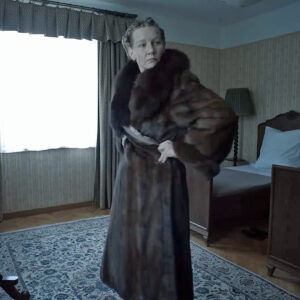 mean the focus is almost entirely upon the husband, wife, kids, and visiting friends. (And there is also a brief visit from wife Hedwig’s mother.) The “friends” are fellow Nazi officers and their families. Early on, Hedwig (Sandra Húller) models with braggadocio a full length ermine coat she has just received. We assume the coat has been taken from one of the new Jewish inmates. If that isn’t sickening enough, she later uses a tube of lipstick, procured from an inmate—without any sign of emotion whatsoever. It’s just another day of surprise gifts for her. She even dumps a load of shirts, pants and skirts on one of her kids’ beds, telling them to grab their choices! And they dive in without hesitation. Hey, it’s their way of life—made possible through death.
mean the focus is almost entirely upon the husband, wife, kids, and visiting friends. (And there is also a brief visit from wife Hedwig’s mother.) The “friends” are fellow Nazi officers and their families. Early on, Hedwig (Sandra Húller) models with braggadocio a full length ermine coat she has just received. We assume the coat has been taken from one of the new Jewish inmates. If that isn’t sickening enough, she later uses a tube of lipstick, procured from an inmate—without any sign of emotion whatsoever. It’s just another day of surprise gifts for her. She even dumps a load of shirts, pants and skirts on one of her kids’ beds, telling them to grab their choices! And they dive in without hesitation. Hey, it’s their way of life—made possible through death.
 Zone is filmed in near documentary technique reminiscent of the cinéma vérité style of seemingly hidden camera, non-narrated. There is no speaking to the camera. Using that technique, we observe family members watering and trimming plants in the nicely kept garden near the house. There’s an obviously dressed inmate delivering wrapped clothing from the camp next door. The family goes swimming at a nearby lake wherein a corpse floats nearby.
Zone is filmed in near documentary technique reminiscent of the cinéma vérité style of seemingly hidden camera, non-narrated. There is no speaking to the camera. Using that technique, we observe family members watering and trimming plants in the nicely kept garden near the house. There’s an obviously dressed inmate delivering wrapped clothing from the camp next door. The family goes swimming at a nearby lake wherein a corpse floats nearby.
Then there are those surreal scenes of dad Rudolf reading a literally grim fairy tale (Hansel and Gretel) to his daughter at bedtime.
While no images of life inside Auschwitz are shown, we do see its chimney smoking. There is no graphic violence, but there are certainly threats of such. And throughout the film, periodic  sounds of distant gunfire, babies crying, and adults screaming are heard. At other times, the chirping of birds is heard.
sounds of distant gunfire, babies crying, and adults screaming are heard. At other times, the chirping of birds is heard.
At one point, Rudolf is reassigned to another station. This creates stress on his family since they have to move. They do not want to leave their idyllic life. (Interestingly, the Höss house is still standing. Due to its noticeable age, however, a duplicate was built nearby for filming.)
Noteworthy is Mica Levi’s guttural music tones, heard at the opening and closing.
As The Zone of Interest reaches its powerful conclusion, we are left with such blatant, sad irony.
—————
GRADE on an A-F Scale: A
Medieval dark fantasy ‘Damsel’ releases dragon for big time creeps, thrills
 By Steve Crum
By Steve Crum
It’s in the title. That Damsel moniker implies there is a young lady in distress, and so goes the movie. About 30 minutes into the plot, after the gorgeously photographed countryside opening and happy royal marriage plans, the distress portion sets in. Ready yourself for a fiery take on The Most Dangerous Game.
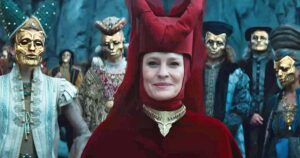 Sort of.
Sort of.
As written by Dan Mazeau, Damsel spins on the cliché story of human sacrifice to appease a fire breathing dragon. What sets that apart is the casting of Millie Bobby Brown in the lead role of Elodie. After establishing herself a few years back as a very athletically capable fighter in the popular sci-fi series Stranger Things, Brown portrays a bride literally tossed into a dragon’s lair. She then fends for herself big time. So goes the crux of the 110-minute movie. Aided by Larry Fong’s impressive cinematography and David Fleming’s score, Damsel escalates into a showcase of spectacle and heroic adventure.
Besides Brown’s portrayal, there are noteworthy performances by Ray Winstone as Elodie’s troubled father; Angela Bassett (Lady Bamford, Elodie’s stepmom); Brooke Carter (Floria, the younger sister); Nick Robinson (Prince Henry, Elodie’s “husband”); and Robin Wright (Queen Isabelle, Elodie’s “mother-in-law”). The quote marks  designate a marriage gone sideways, so to speak.
designate a marriage gone sideways, so to speak.
While on the run and hiding from the very savvy dragon (voiced by Shohreh Aghdashloo), Elodie encounters a variety of both obstacles and helpers. The latter includes a cavernous room lit by glowing slugs! As for the former, the conniving and seemingly all-knowing dragon provides road block (or cave block) repeatedly.
Bring on the glowing slugs and Elodie’s own shrewdness.
By the time the riveting story segues into a direct confrontation between heroine and dragon (spoiler alert?), it is clear that Damsel is Millie Bobby Brown’s property, her showcase. That plus carries over into a surprising conclusion worthy of the best dragon flicks ever made.
—————
GRADE on an A-F Scale: B+
‘Rustin’ tells fascinating story about heretofore unheralded civil rights leader
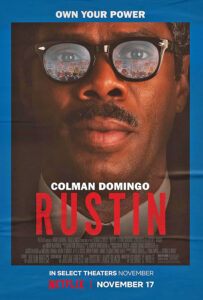 By Steve Crum
By Steve Crum
“It’s a rethinking of our history,” says Oscar nominated Colman Domingo about Rustin, the fascinating story of mostly unknown civil rights leader Bayard Rustin. In it, Domingo plays Rustin—terrifically so.
Directed by George C. Wolfe (Ma Rainey’s Black Bottom and numerous Broadway plays), Rustin opens in 1954, when segregation in the United States was ruled unconstitutional. Cue newsreel footage and the like, establishing the 20th Century historical setting and baseline for Julian Breece’s story and screenplay. (Credit also goes to Dustin Lance Black as screen scribe.)
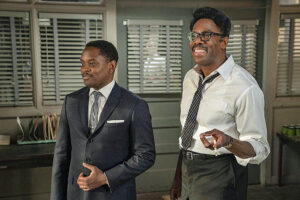 Cut to 1960, when Bayard Rustin was challenging Dr. Martin Luther King (Ami Amen) to lead a rights march at the Democrats’ convention in Los Angeles. It was the beginning of Rustin’s activism, as well as the first time MLK took a stance for non-violence. They butted philosophical heads. Rustin loses the round, and is demoted/fired for his extremism. His passion for activism, however, only increases. Rustin and King are still at odds when the former conceives of a gigantic civil rights march on Washington D. C.
Cut to 1960, when Bayard Rustin was challenging Dr. Martin Luther King (Ami Amen) to lead a rights march at the Democrats’ convention in Los Angeles. It was the beginning of Rustin’s activism, as well as the first time MLK took a stance for non-violence. They butted philosophical heads. Rustin loses the round, and is demoted/fired for his extremism. His passion for activism, however, only increases. Rustin and King are still at odds when the former conceives of a gigantic civil rights march on Washington D. C.
Despite the NAACP and other rights leaders talking Rustin’s plan down, Rustin doubles down on first convincing Dr. King that it would propel the civil rights 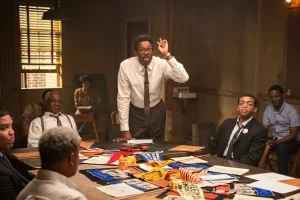 movement…peacefully.
movement…peacefully.
It is no spoiler to note that the Civil Rights March in August of 1963 was successful beyond expectations. Act 3 of Rustin focuses on the preparations for the immense undertaking. How would the expected 100 thousand attendees be transported to D. C.? Where would they be located in the area facing the Lincoln Memorial? What about security?
An excellent ensemble cast portrays civil rights leaders and activists. Among them are Chris Rock as Roy Wilkins, Glynn Truman (A. Phillip Randolph), Jeffrey Wright (Adam Clayton Powell Jr.), Maxwell Whittington-Cooper (John Lewis), Da’Vine Joy Randolph (Mahalia Jackson), and Carra Patterson (Coretta Scott King).
It is an awesome motion picture recreating an awesome time in our nation. Despite all the roadblocks (NAACP disagreement, persecution of Rustin’s gay private life), the various civil rights groups finally  got on board.
got on board.
By the way, as noted in Rustin, over 250 thousand people attended the event, hearing Dr. King’s “I Have a Dream” speech in person.
—————
GRADE on an A-F Scale: A
